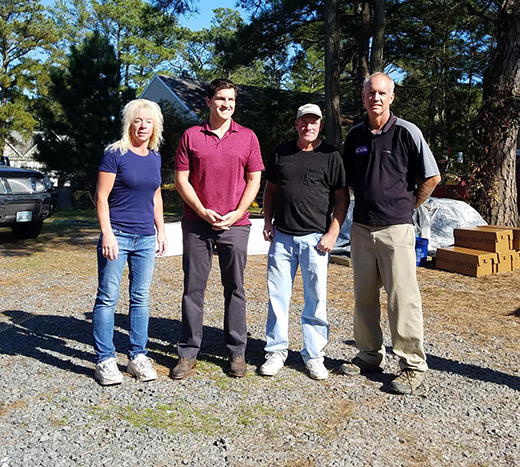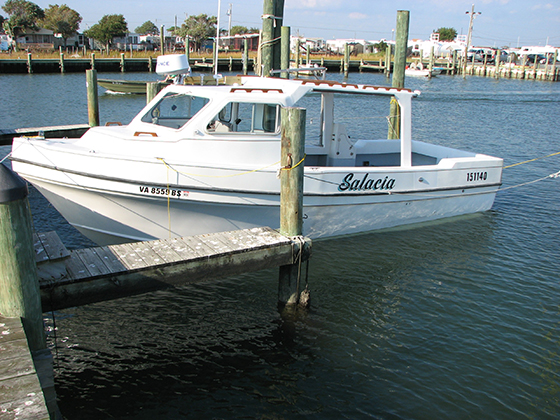
By Connie Morrison —
Even though he works in isolation, Chincoteague waterman Jim Dawson says he and other fishermen are feeling the effects of COVID-19.
Dawson, one of Virginia’s largest sea bass harvesters, says markets for fresh fish have dried up leaving him with nowhere to sell his product.
Black sea bass is popular in U.S. markets catering to Asian cuisine, but because U.S. Asian food markets were impacted by Feb. 1, “Nobody wanted to buy anything because nobody was coming out to eat,” Dawson said.
Dawson’s account echoes that of Woody Zember, who owns a crab picking company in Onley. Restaurants were affected by, first, the order of no more than 10 people together, and later, when they were made to go to takeout only.
The Jessup Market outside Baltimore, which serves the Washington, D.C., Baltimore, Philadelphia, and other markets, is a key location for selling crabs. “The restaurants aren’t ordering, so they aren’t even sending their trucks out,” said Zember.
As of March 24 none of Dawson’s black sea bass pots were in the water. The global pandemic “has really changed the whole dynamics of fisheries,” he said.
“We talked to the Bronx market yesterday,” he said in a March 24 interview, “and they said our fish company was 40% down from normal,” but because sea bass has such a large Asian clientele, he was told, “‘Do not go fishing. We will not buy your fish,’ so we are at zero.”
Dawson said flounder trawlers are selling their catches for “$1.25 per pound, where they would normally get $4.” If they are paying the large producers that little, “I can’t catch enough to make ends meet,” he said.
He has adapted to the changing market by selling fish to the public locally, but it’s nowhere near the commercial volume he was selling before. The family is setting up a website for sales (www.lobstaladyseafood.com) for orders, but for now is relying on phone calls for orders (757-894-3306).
Del. Rob Bloxom, who commercially raises shellfish, emphasized that it isn’t just fishermen who are affected, but the Shore’s large aquaculture industry as well.
One Eastern Shore aquafarm “just shut right down,” he said. “The only thing rolling right along is chicken. People aren’t eating out now.”
The 2017 agriculture census, the latest available, disclosed Northampton and Accomack counties ranked first and second in the state in mollusk aquaculture, with a combined value of $5.6 million.
U.S. Rep. Elaine Luria has spoken with watermen and aquaculture producers and hears the strain in their voices.
“We understand that this is very difficult across the community and across a whole spectrum of industries,” she said, adding that $300 million for fisheries and aquaculture was included in the CARES Act, the federal financial relief package passed last week by Congress. It includes “direct assistance to fisheries and aquaculture operations that have been impacted by the COVID crisis,” she said.
The relief funds are available to “fishery participants” who have experienced losses of more than 35% as a direct result of the COVID-19 pandemic compared to the prior five-year average revenue.
‘‘Fishery participants’’ include tribes, persons, fishing communities, aquaculture businesses not otherwise eligible for assistance under part 1416 of title 7 of the Code of Federal Regulations for losses related to COVID-19, processors, or other fishery-related businesses, who have incurred losses as a direct or indirect result of the coronavirus pandemic.
Guidance for administering the funds is being developed on a fast track, and National Oceanic and Atmospheric Administration (NOAA) will administer the funds. Watermen and aquaculture businesses may also be eligible for Small Business Administration loans.
Luria recommends checking NOAA’s COVID-19 page (https://www.fisheries.noaa.gov/national/noaa-fisheries-coronavirus-covid-19-update), going to the SBA (https://www.sba.gov/page/coronavirus-covid-19-small-business-guidance-loan-resources) or contacting Caroline Bott at Luria’s Eastern Shore office for assistance (25020 Shore Parkway, Suite 1B, Onley, VA 23418; Phone: 757-364-7631; appointments are recommended).

Fishing is a family business for Dawson. His three children and wife, Katie, are all involved in some part of it — whether cleaning, marketing, or deliveries where flash-frozen fish are left in coolers customers place outside to avoid contact during the COVID-19 pandemic. The family also harvests lobsters.
Zember is not fully staffed yet this season and is operating with three of his most experienced workers — all local — who sit eight feet apart and are constantly monitored.
Like Dawson, Zember is targeting local markets, relying on the loyalty of established customers to move his product.
Crabs have been available to pick because crabbers haven’t been able to sell all their catches. “Sometimes they are so hard to sell that the buyer I get them from can’t even buy any from anybody because he can’t sell any,” he said, “so I try to schedule what I need.”
He expects to sell all his supply this week, but he is only at about 25% of his usual production. “I should be full production and shipping out, but I’m not able,” Zember said. “I’m lucky my local business has come through so strong this spring.”
Dawson has heard small businesses described as the engine of the economy, but he likes to think of them like the lubricant to the country’s massive economic engine.
There has been plenty of talk about how to stimulate the economy, including the agriculture segment, but Dawson thinks little attention has been given to the seafood industry.
“We’re the farmers of the water,” he said, and “I can’t catch enough fish to make ends meet.”
CARES Act Assistance to Fisheries
“ASSISTANCE TO FISHERY PARTICIPANTS SEC. 12005. (a) IN GENERAL.—The Secretary of Commerce is authorized to provide assistance to Tribal, subsistence, commercial, and charter fishery participants affected by the novel coronavirus (COVID–19), which may include direct relief payments. (b) FISHERY PARTICIPANTS.—For the purposes of this section, ‘‘fishery participants’’ include Tribes, persons, fishing communities, aquaculture businesses not otherwise eligible for assistance under part 1416 of title 7 of the Code of Federal Regulations for losses related to COVID–19, processors, or other fishery-related businesses, who have incurred, as a direct or indirect result of the coronavirus pandemic— (1) economic revenue losses greater than 35 percent as compared to the prior 5-year average revenue; or (2) any negative impacts to subsistence, cultural, or ceremonial fisheries. (c) ROLLING BASIS.—Funds may be awarded under this section on a rolling basis, and within a fishing season, to ensure rapid delivery of funds during the COVID–19 pandemic. (d) APPROPRIATIONS.—In addition to funds that are otherwise made available to assist fishery participants under this Act, there are authorized to be appropriated, and there are appropriated, $300,000,000, to remain available until September 30, 2021, to carry out this section, of which up to 2 percent may be used for administration and oversight activities. (e) EMERGENCY REQUIREMENT.—The amount provided by this section is designated by the Congress as being for an emergency requirement pursuant to section 251(b)(2)(A)(i) of the Balanced Budget and Emergency Deficit Control Act of 1985.”


